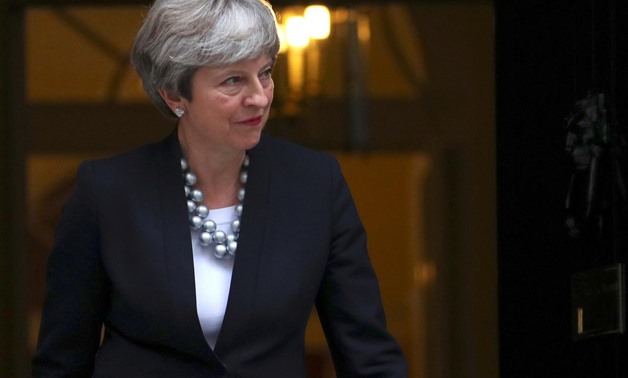
Britain's Prime Minister Theresa May walks out of 10 Dowining Street to welcome Ireland's Taoiseach Leo Varadkar in London, September 25, 2017. REUTERS/Hannah McKay
LONDON - 28 September 2017: British Prime Minister Theresa May on Thursday defended free markets as the proper way to run an economy, a day after emboldened opposition leader Jeremy Corbyn said his left-wing ideas now represented the political mainstream.
May, whose Conservative Party is running neck and neck with Corbyn's Labour Party in opinion polls, said properly regulated markets were essential to boost living standards, and she stuck to her government's plans to cut debt without raising taxes sharply.
"A free market economy ... is unquestionably the best, and indeed the only sustainable means of increasing the living standards of everyone," May told a conference hosted by the Bank of England.
May has struggled to persuade voters that the economic policies pursued by British governments since the 1980s are still the best answer to the country's problems. She lost the Conservatives' parliamentary majority in an election in June.
Living standards have fallen since May's Conservatives came to power in 2010, due to years of meagre wage growth and bouts of high inflation - including a slowdown caused by last year's vote to leave the European Union.
BoE Governor Mark Carney, speaking at the same event, told May that the central bank's ultra-low interest rates and other stimulus programmes would be unable to offset the likely hit to the economy from Brexit.
"The biggest determinants of the UK’s medium-term prosperity will be the country’s new relationship with the EU and the reforms it catalyses," he said, repeating comments he has made previously on Brexit.
"Most of the necessary adjustments are real in nature and therefore not in the gift of central bankers."
Credit ratings agency Moody's downgraded its assessment of Britain's ability to service its debts last Friday due to concerns that Brexit would hurt growth and that the government was finding it harder to keep spending under control.
Separately on Thursday, May criticised U.S. planemaker Boeing, warning that its behaviour in a trade dispute which threatens thousands of British jobs was undermining its commercial relationship with Britain.
STICKING TO THE SCRIPT
In her speech, May appealed to what many Conservatives see as their pro-business, fiscally prudent core values before her party's annual conference next week.
"Unfunded borrowing and significantly higher levels of taxation would damage our economy, threaten jobs, and hurt working people," she said.
Corbyn told Labour's annual conference on Wednesday that they were "on the threshold of power".
He is Labour's most left-wing leader since the early 1980s, and his top finance official proposed this week nationalising privately-funded infrastructure, capping credit card interest payments and squeezing more tax from big business.
May and Carney were speaking at the start of a two-day conference to mark 20 years of BoE independence.
May was challenged in a question-and-answer session about comments she made last year when she said record-low BoE rates had "bad side effects," suggesting she wanted them to rise.
Carney said at the time he did not "take instruction" from politicians, and May clarified on Thursday that she did not think the BoE had been wrong to cut rates.
"The point that I was making was that action that is taken to deal with one issue, that was necessary action and rightly taken by an independent Bank, does have implications for others," she said.
While the BoE's independence is widely seen as a big factor in Britain's economic stability for much of the past 20 years, speakers at Thursday's event said it was exposed to attack from critics of its ultra-low interest rates.
Former prime minister Gordon Brown - an architect of the bank's independence - said the BoE needed to have a formal relationship with the finance ministry to jointly work on strategy during future crises.
He said he had been dismayed while prime minister at the time of the global financial crisis when the BoE did not cut interest rates as quickly as he wanted and then pressed the government not to increase spending to help the economy.
"I think there is something missing in the system that will haunt us if a crisis were to hit Britain," Brown said.


Comments
Leave a Comment